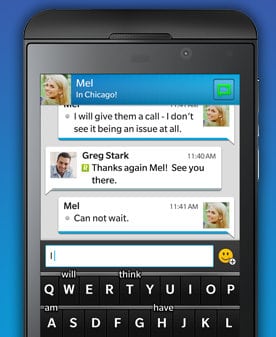
Word on the street is BlackBerry will release its long awaited BBM (BlackBerry Messenger) app for iOS and Android this week. Back in the day when BlackBerry ruled supreme–circa 2004–BBM was universally loved. Allowing for instant messaging between BlackBerry devices, the service proved to be easy to use, fast, and (for the most part) secure. Avoiding costly SMS charges, however, was likely the number one reason why users flocked to BBM in droves.
That there is still pent up demand, after all these years, for BBM to be made available on platforms other than BlackBerry is testament to the everlasting love for the product.
BlackBerry has sent out invitations for a press event on September 18th (“To find out how to make every conversation feel like you’re there…”), which is when many are speculating they will announce the BBM app; the company tweeted in August that it had submitted BBM to Apple, and then just a few days teased the faithful again on Twitter with this:
It’s been one year since BBM was added to the dictionary. Soon, it’ll be added to #Android & #iPhone https://t.co/qq39sHE9tz #BBM4All
— BlackBerry (@BlackBerry) September 13, 2013
If you are interested in getting the news when it hits, here’s the BBM sign-up form on the BlackBerry web site. Also, their marketing team has rolled out the “#BBM4ALL” marketing campaign which could be a hash tag worth following if you want to get the latest scoop.
But, if BMM does hit the Apple App Store and Google Play Store this week it’s going to face competition the likes of which it has never seen before.
This is the App Economy. Today there are hundreds, if not thousands, of apps that offer some sort of messaging service: Handcent, Kik Messenger, IMO, GoSMS, WhatsApp, ICQ, Viber, Skype, and scores of others. It seems like a new messaging or video chat app arrives every other day.
Also, don’t forget, Facebook has its own Messenger feature that is quite popular, “chat heads” and all.
My favorite, Google Voice, is often overlooked. That app, which also allows you to sign up for a virtual phone number, is one of the main reasons I’m loyal to the Android platform (though, not so loyal to my flaky LG-made Nexus 4).
It’s unclear to me what compelling differentiator BBM can offer in today’s crowded marketplace for messaging.
One thing it has going for as I noted is its brand. BBM has a sizeable fanbase. Could it be that BlackBerry gets split up as a company, and the software division, including the BBM app, eventually outperforms its hardware peer?

